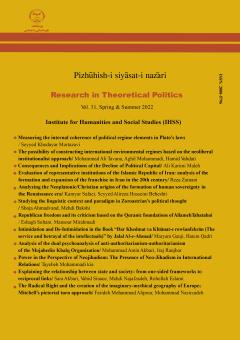Intimidation and De-Intimidation in the Book “Dar Khedmat va Khīānat-e rowšanfekrān (The service and betrayal of the intellectuals)” by Jalal Al-e-Ahmad
Subject Areas : Research in Theoritical Politicsmaryam gandji 1 , Hatam Ghaderi 2
1 - PhD in political thought.TarbiatModares University, Iran
2 - Retired Professor, Department of Political Science, TarbiatModares University, Iran.
Keywords: return to self", Intimidation, Jalal Al-e-Ahmad, de-Intimidation.,
Abstract :
The ruling political system duringthe Pahlavi II era, with its cultural policies, development-oriented economic views, and the creation of an atmosphere of repression and suffocation, turned its desirable discourse of Iranian identity, originated in Westernism, modernism, and archaism, into the only dominant discourse and marginalized other parallel discourses and voices. In such an atmosphere, the idea of "return to self" was raised and favored in the intellectual circle. In almost all research, this idea has been investigated as an answer to the question of identity and the desire to seek the identity of Iranian society. This article focuses its central question on the relationship between "return to self" and the Intimidation of the ruling political system and believes that according to Jalal Al-e-Ahmad, this idea has been an attempt to create an alternative to the dominant ideological and identity discourse of the political system. The hypothesis of the present article considers "return to self" as an attempt to de-Intimidationthe dominant discourse of the ruling political system; however, within this idea, the seed of Intimidationand turning into a single voice and marginalizing alternatives and other voices have also been cultivated.
آدورنو، تئودور و ماکس هورکهایمر (1384) دیالکتیک روشنگری، ترجمه مراد فرهادپور و امید مهرگان، تهران، گامنو.
آشوری، داریوش (1387) ما و مدرنیت، تهران، صراط.
آلاحمد، جلال (1386) در خدمت و خیانت روشن¬فکران، تهران، فردوس.
بروجردی، مهرزاد (1377) روشن¬فکران ایرانی و غرب، ترجمه جمشید شیرازی، تهران، فرزان روز.
تورن، آلن (1380) نقد مدرنیته، ترجمه مرتضی مردیها، تهران، گامنو.
دانایی، محمدحسین (1392) دو برادر؛ ناگفتههایی از زندگی و زمانة جلال و شمس آل احمد، به اهتمام محمدرضا کائینی، تهران، اطلاعات.
رجایی، فرهنگ (1376) معرکه جهانبینیها در خردورزی سیاسی و هویت ما ایرانیان، تهران، احیاء کتاب.
ریکور، پل (1383) «احیای معنا یا کاهش توهم»، ترجمه هاله لاجوردی، ارغنون، شماره 3، زمستان، صص 1-10.
شایگان، داریوش (1380) افسونزدگی جدید، ترجمه فاطمه ولیانی، تهران، فرزان روز.
فانون، فرانتس (1336) دوزخیان زمین، ترجمه علی شریعتی، اهواز، تلاش.
قادری، حاتم (1387) سویههای هویت، تهران، شیرازه.
قاضیان، حسین (1386) جلال آلاحمد و گذر از سنت به تجدد، تهران، کویر.
قیصری، علی (1383) روشن¬فکران ایران در قرن بیستم، ترجمه محمد دهقانی، تهران، هرمس.
میرآخوری، قاسم و حیدر شجاعی (1376) مرغ حق: زندگی و اندیشه جلال آلاحمد، تهران، جامی.
میرسپاسی، علی (1386) تأملی در مدرنیته ایرانی، تهران، طرح نو.
نبوی، نگین (1388) روشن¬فکران و دولت در ایران: سیاست، گفتار و تنگنای اصالت، ترجمه حسن فشارکی، تهران، شیرازه.
وحدت، فرزین (1383) رویارویی فکری ایران با مدرنیت، ترجمه مهدی حقیقتخواه، تهران، ققنوس.
هاشمی، محمدمنصور (1383) هویتاندیشان و میراث فکری احمد فردید، تهران، کویر.
Josselson, Ruthellen (2004) The Hermeneutics of Faith and the Hermeneutics of Suspicion, Narrative Requiry, 14 (1), 1-28.
Ricoeur, paul (1970) Freud and philosophy: An essay on interpretation, (D. Savage, Trans. ), New Haven, CT: Yale University Press.
----------------- (1981) Hermeneutics and the Human Science, Cambridge.


